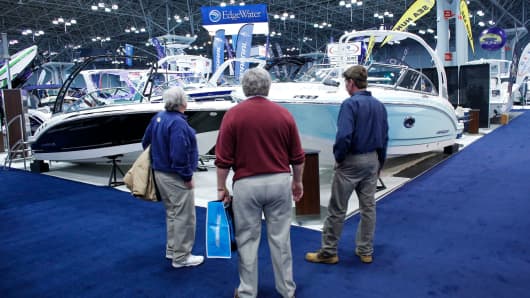In April, Commerce announced a countervailing duty of approximately 33 percent on common alloy aluminum sheet imported from China, with non-cooperative companies facing duties as high as 113 percent. This duty will significantly increase the cost of a primary material used to manufacture 43 percent of new power boats sold each year. To put that in perspective, that's over 111,000 new boats that will now be more expensive to produce, and in turn, to buy.
American manufacturers rely on a competitive global market and fair pricing. For example, U.S. marine manufacturers source a whopping 90 percent of their aluminum from domestic mills. But tariffs, by design, distort the market and inevitably drive up prices – even here at home. With the 10 percent Section 232 tariff, and a 33 percent countervailing duty, aluminum prices will skyrocket. As history has shown us, higher prices for raw materials only mean one thing: Higher prices for American consumers.
But it doesn't stop there. Things will only get worse when Commerce announces their antidumping duties in June, which will compound this problem no matter the scope. The administration also recently announced a new proposal for a 25 percent tariff on a long list of imported products from China, including marine navigational, component, and engine equipment, this time invoking Section 301 of the Trade Act of 1974.
This announcement, which was all but universally condemned by industry and trade experts, further sowed confusion and stands to disrupt countless industries that rely on the 1,300-some products that will be impacted by the tariff. While China must be held accountable for its unfair trade practices, particularly its theft of intellectual property, the proposed tariffs will undoubtedly threaten the stability of the recreational boating industry.
The administration's recent actions on trade – which increasingly seem like attempts to fulfill anti-China campaign promises – are in direct conflict with another campaign promise: To protect American manufacturing. Recreational boating is a uniquely American industry, in which 95 percent of boats sold in the U.S. are made in the U.S. Because our boats are made at home, the revenue generated by boat sales goes directly back into the pockets of hardworking Americans.
Together, the Administration's actions increase the cost of manufacturing in the U.S., resulting in less domestic production, higher prices for American consumers, and fewer jobs for American workers.
In an attempt to level the playing field for U.S. aluminum, Commerce continues to put large swaths of American manufacturing at a disadvantage. I urge the Administration to deal with these issues by focusing on formal trade agreements rather than sparking trade wars. Only then will we protect American jobs, American companies and American consumers.
Commentary by Thom Dammrich, president of the National Marine Manufacturers' Association, the leading trade organization for the North American recreational boating industry.
For more insight from CNBC contributors, follow
@CNBCopinion
on Twitter.


